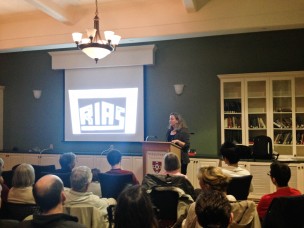
Bellamy Pailthorp ’89 gave a talk at the Russell House on Wednesday, Oct. 29 titled “The Fall of the Wall-—An Eyewitness Perspective” as part of a series of lectures hosted by the German Studies Department.
The German Studies Department received a grant from the German Embassy in Washington, D.C., designed to facilitate the commemoration of the 25th anniversary of the fall of the Berlin Wall. Part of this grant is going toward this lecture series.
Pailthorp, a news reporter at an NPR affiliate (KPLU), was a University graduate who received a Fulbright scholarship to study in Berlin after graduation. After arriving in Berlin, she worked as a translator for an American journalist, Chris Hedges. She was working for Hedges the day the Wall came down and remembers the event vividly.
“The streets were crowded for days, and after a certain point you could not buy any more bananas,” Pailthorp said. “They sold out very quickly. People were lining up at the banks to get their greeting money and just a big massive party for several days in the streets. I found it a little bit scary. I’ve never been a person who loves big crowds. I found the atmosphere a bit threatening.”
Adjunct Associate Professor of German Iris Bork-Goldfield described what she hopes Pailthorp’s talk will accomplish.
“[The fall of the Berlin Wall] is really a historical event of major consequence not only to Germany, but also to the world, and I also hope for [students] to, besides the historical implication and also the importance in politics, also see how important it is to get involved and also to see with [Pailthorp] that you never know where life will lead you,” Bork-Goldfield said.
Lawrence Ma ’16, who attended the event, spoke about why Pailthorp’s talk resonated with him.
“The way Bellamy brought up the Tiananmen Square massacre that happened in the same year really put into perspective the fear that protestors in Germany experienced and what the stakes were for them,” Ma wrote in an email to The Argus. “And for a person who has only been exposed to the history of the Berlin Wall in class, it’s easy to distance myself and not realize the incredible emotional resolve the protestors possessed.”
Bork-Goldfield also hopes that the talk will help students realize that there are numerous career possibilities with a degree in German Studies.
“Sometimes people ask me why anyone would want to study German Studies, but it’s a broad field and a Fulbright [scholar] really was able to explore a new country and happened to be there at a time when it was extremely exciting to be there,” Bork-Goldfield said. “So I hope they see that one doesn’t always know where your life will end up and you should be open.”
Pailthorp discussed how she, as a German Studies major, had no idea what she wanted to do after she graduated. She applied for a Fulbright Scholarship based on Professor of German Studies Krishna Winston’s recommendation. Pailthorp ended up living in Germany for eight years working as a reporter before returning to the United States for graduate school.
“Just to have faith that if you’re doing something that you enjoy, that it’ll work out for you, and that if you can find something you’re doing not just for the money but because you genuinely get some pleasure out of it or inspiration, that eventually you’ll find your path within that,” Pailthorp said.
Another student who attended the event, Jacqueline Heitkamp ’15, said she felt inspired by how up front Pailthorp was about her meandering career path.
“I went to the talk because I really have no idea what I’m doing with my life after this year and it’s always really comforting to hear a story of a fellow Wesleyan student who found her life calling after graduation,” Heitkamp wrote in an email to The Argus. “Things came together so brilliantly for her. I mean the fact that she turned her Fulbright into a career in journalism just by exploring Berlin—East and West—right before the Wall came down was so perfect.”
Bork-Goldfield hopes the talk will encourage students to become involved in today’s current events because the amount of public awareness of and presence in Berlin helped enormously in tearing down the Wall.
“We have an election coming up here in the United States, and I’m surprised at how many of my students tell me that they are not interested in politics, and some of them even say they won’t go and vote, and it makes me sad that they feel it is not important,” Bork-Goldfield said. “I hope events like that will show them that it is important to be involved. The wall would not have come down if people in East Germany hadn’t been engaged.”
Pailthorp agreed, saying that if people could work up the courage to vote under a communist system, those in the United States should be able to keep themselves informed and vote.
“Remember that there are people all over the world who don’t have a life as easy as ours, as hard as it might seem sometimes,” Pailthorp said.
The series will conclude on Thursday, Nov. 6 with a lecture by Krishna Winston, who will read from “Too Far Afield” Günter Grass. Winston translated the novel about the reunification of Germany from German to English.


Leave a Reply